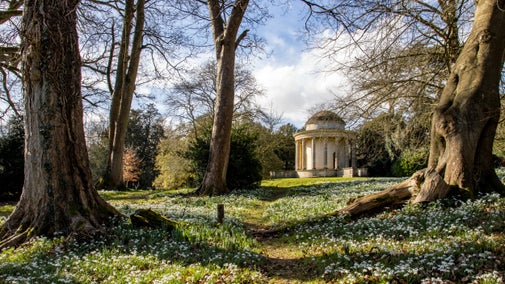
Discover more at Chastleton
Find out when Chastleton is open, how to get here, the things to see and do and more.

Discover a series of discrete spaces which provide an intimate setting for the house. Within high protective walls, our gardens exude a sense of peace and relaxation. Clipped topiary and neat croquet lawns are contrasted with the more natural Wilderness Walk.
The garden is now closed for winter. We look forward to welcoming you back when the house and wilderness walk re-open on 5 March.
We take a unique approach here at Chastleton, conserving and preserving the house in the condition in which it was found. But how does that translate to the garden, where living things grow and change?
The garden nods to changing fashions but still largely maintains its original Jacobean layout, dividing spaces according to use and preserving a secret, private feel.
The Wilderness Walk was a late Victorian addition, designed to be natural but neatly maintained. It was more than likely meant to be a perimeter walk of the garden. To protect the more delicate areas such as the Best Garden, the Wilderness Walk is the only area open during periods of heavy rainfall. It offers a pleasant walk and offers changing views of the house and the rest of the garden through the seasons.
In 1849 John Henry Whitmore Jones enclosed a patch of an adjacent field to make the present Kitchen Garden. When the National Trust took over in the early 1990s, the Victorian layout had been replaced by lawn; however, it is now fully restored. Look out for displays of pumpkins and dahlias in September and October.
The produce grown here is sold in the second-hand bookshop, and cut flowers are used in the house. You can pick up some of the seasonal produce grown in the Kitchen Garden to take a taste of Chastleton away with you. (Subject to availability: when it's gone, it's gone!)

The Jacobean ‘Pleasaunce’, or Pleasure Garden, was known by the early 1700s as the Best Garden, a name that perfectly sums up its status and relationship to the house. It was accessible only via the Great Parlour and overlooked by the Great Chamber, Fettiplace Room, and the Long Gallery. Through it the family and their guests could walk straight to the church.
Topiary came into fashion in Britain following its introduction to Hampton Court in the 1590s. The Chastleton topiary has probably been replanted three times, reaching its peak in the early 20th century. During this time, it was regularly clipped into shapes including a cat, teapot, snail, chicken, and peacock among many other designs. However, by the 1970s the topiary was being clipped only once a year and the hedges eventually lost their distinct shapes.
In 2023, we finished a project to restore the Best Garden to a version of what it might have looked like at the turn of the 20th Century. Flower beds in and around the central circular feature have been re-cut, planted up, and will mature and grow over the coming years, providing big, colourful displays in the summer months and into September.
Standing on the north terrace you’ll see the croquet lawns. The games that have been played here reflect changing fashions over the years. For example, in the Jacobean times, these lawns were used to play bowls, and it was popular enough to warrant the building of a viewing terrace, which you can still see today.
The Victorian residents of Chastleton favoured croquet, then tennis. Walter Whitmore Jones codified the rules of croquet on these very lawns, and on a dry day between May and the end of September, visitors are welcome to play a game on the lawns.

Find out when Chastleton is open, how to get here, the things to see and do and more.

Chastleton house is now closed for winter. We look forward to welcoming you back from Wednesday 5 March 2025.

Chastleton was built as a display of wealth and status, but eventually fell into a state of romantic neglect. Discover the history of this fine 17th-century country house.

Explore how changing tastes influenced the style of gardens over the centuries and discover where you can find the best examples from each period at the places we care for.

From 18th-century water gardens and Arts and Crafts landscapes to intimate woodland gardens, there are so many places to discover.

Discover our gardeners’ top tips so you can make the most of your garden, plot or window box.

Gardens from the grand scale of Stowe's landscape garden to formal parterres at Hughenden and Cliveden and the intimate walled garden 'rooms' at Greys Court.